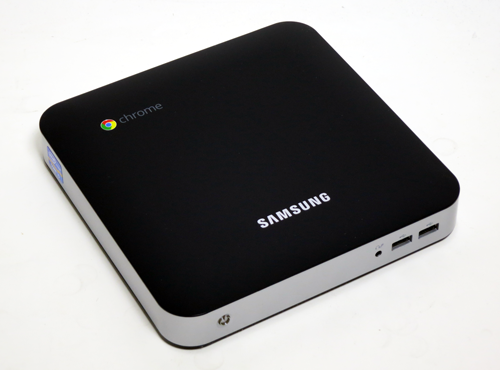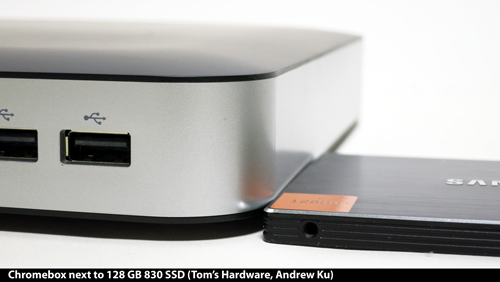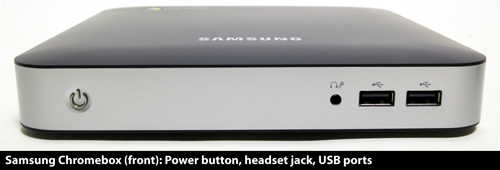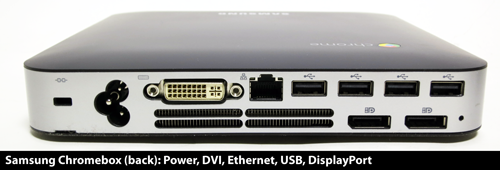Fast, Small, And Complete? Samsung's $329 Chromebox
Meet Samsung's $329 Chromebox
All of us in the Southern California lab own at least one gaming PC. But most of us also have smaller, lighter machines around the house. Some of them handle home theater duties and others are used by the kids. Although some of what we do is performance-intensive, we have no trouble admitting that many of the tasks we perform outside of work require a lot less processing power.
We've taken a couple of looks at nettops in the past month, first in Good Things In Small Packages: Seven Nettop Platforms, Tested, and then in Does Size Matter? Four Very Small Nettops Get Reviewed. Some of the systems in those stories have shown us that relatively lightweight hardware can easily handle home office duties, Web browsing, and even Blu-ray movies when you get your hands on the right GPU.
Unfortunately, while the platforms are generally pretty affordable, factoring in a Windows 7 license, an office productivity suite, and DVD decoding software can quickly double the machine's price. For their part, the hardware manufacturers are putting together compelling packages. But finishing them off is an expensive proposition.
Samsung's Chromebox takes a one-two swing at the nettop space with a potent hardware platform that doesn't require an investment in software. Unveiled at I/O 2012, the Chromebox leverages Google's open-source Chrome OS, a Linux-based operating system designed to work exclusively with Web-based applications. The low-profile Chromebox looks like a feeble nettop, but it actually sports a respectable Intel Celeron processor. And by leveraging Chrome OS, Samsung effectively eliminates the software expense, enabling a more complete package that sells for $329.
Samsung complements that alluring price with a well thought-out design. The Chromebox includes six USB 2.0 ports, two of which are found up front. That's a lot more than we've seen from competing nettops, though it would have been nice to get USB 3.0 connectivity as well. The front panel also hosts a power button and an audio jack.
Around back, we see much of the I/O typical of a more powerful desktop PC. For instance, Samsung exposes one single-link DVI output and two DisplayPort connectors that, combined, support up to two 30" screens. Unfortunately, software hiccups limit the outputs to mirroring each other right now, but we'll go into that in more depth shortly. Four more USB ports, gigabit Ethernet, and power input round out the Chromebox's back-side.
Get Tom's Hardware's best news and in-depth reviews, straight to your inbox.
-
ikyung Seems like these boxes will fill the niche computer users who wants small form factors to carry around, etc. But, seems like they can add in USB/HDMI connectors into smartphones and turn it into a full fledge computers one day in the future.Reply -
boletus How can this possibly compete with a $400 laptop, which includes a screen, keyboard, at least a 320 GB hardrive, Windows, and sound? Yeah you have to get a word processor program etc, but there are free options for that. And you can use it on the bus, and hook up external displays, and read/burn DVD's,.... I've seen AMD A8 series laptops for $450, and they can even play real games. How is this worth its price? Am I missing something?Reply -
"sudo (a program enabling the installation of any generic Linux application)" please do some basic research before writing such nonsense.Reply
For example the first line on Wikipedia states:
sudo is a program for Unix-like computer operating systems that allows users to run programs with the security privileges of another user (normally the superuser, or root). Its name is a concatenation of the su command (which grants the user a shell of another user, normally the superuser) and "do", or take action. -
rootheday The article says:Reply
"But the Celeron can't accelerate video decoding, nor does it include Quick Sync support. "
This is a common misunderstanding - the Celeron and Pentium Sandybridge parts disable Quick Sync and some video post processing features (branded as ClearVideo HD) but the hardware accelerated decode is there across the board (Celeron/Pentium/Core) -
palladin9479 ReplyOn the other hand, many of us still prefer the perceived security and privacy of information stored in our own systems and backed up to drives where only we have access to them.
I take offense at this. "Cloud" storage of data is by definition less secure then local storage. Security is done in multiple layers, physical security is one of those layers, arguable the most important. Giving your data to someone else to store is dangerous unless your ~really~ know that person, giving your data to an unknown person via a third party profit orientated entity is extremely dangerous without a legal team in place to secure your best interests.
It's not just "perceived", it's real and tangible. Now we're talking about an online media player / browsing device, very small change of you storing anything personal on it. Anything you do store in "the cloud" will be analyzed by someone "not you". Just hope it doesn't try to store browsing history or media history on "the cloud". -
Onus ^Exactly. I can't take this device seriously. We need to ignore third parties with their own interests in mind urging use to "use the Cloud!" no matter how easy it seems.Reply
That "perceived security" comment was pretty darned offensive...
-
johnners2981 jtt283^Exactly. I can't take this device seriously. We need to ignore third parties with their own interests in mind urging use to "use the Cloud!" no matter how easy it seems.That "perceived security" comment was pretty darned offensive...Reply
Here, have a tissue... -
Belardo Its a cute little box, but even I don't understand its pricing. For a client, this is what I picked up at a local store for $350 (on sale):Reply
Lenovo G-Series (bottom end) i3-2x00 notebook with 4GB RAM / Windows 7 64bit / 320GB HD / 15" screen. Very little junkware.
At Costco: $430
HP Desktop with AMD A6 (bottom end quad core) with 4GB RAM / Win7 64bit / 500GB HD / 23" LCD display, crappy mouse and keyboard. The desktop is of course slower on CPU but faster on GPU.
Its great that we have ChromOS hardware coming out... but it should be $25~50 cheaper than a Windows 7 on software alone.
With Windows8 coming out soon, this is a good time to have alternatives available. Would like to see a bigger push with Linux somehow. -
lamorpa palladin9479..."Cloud" storage of data is by definition less secure then local storage.Then local storage what? If "Cloud" storage of data is by definition less secure, then local storage can be used? (then/than - different words, different meanings, different uses)Reply
-
JeanLuc I'm trying to workout why Google went with an Intel hardware setup when an ARM based SOC would have more then surficied for the purposes for which this sort of device caters for. Less power, less heat and most likely a whole lot cheaper.Reply



